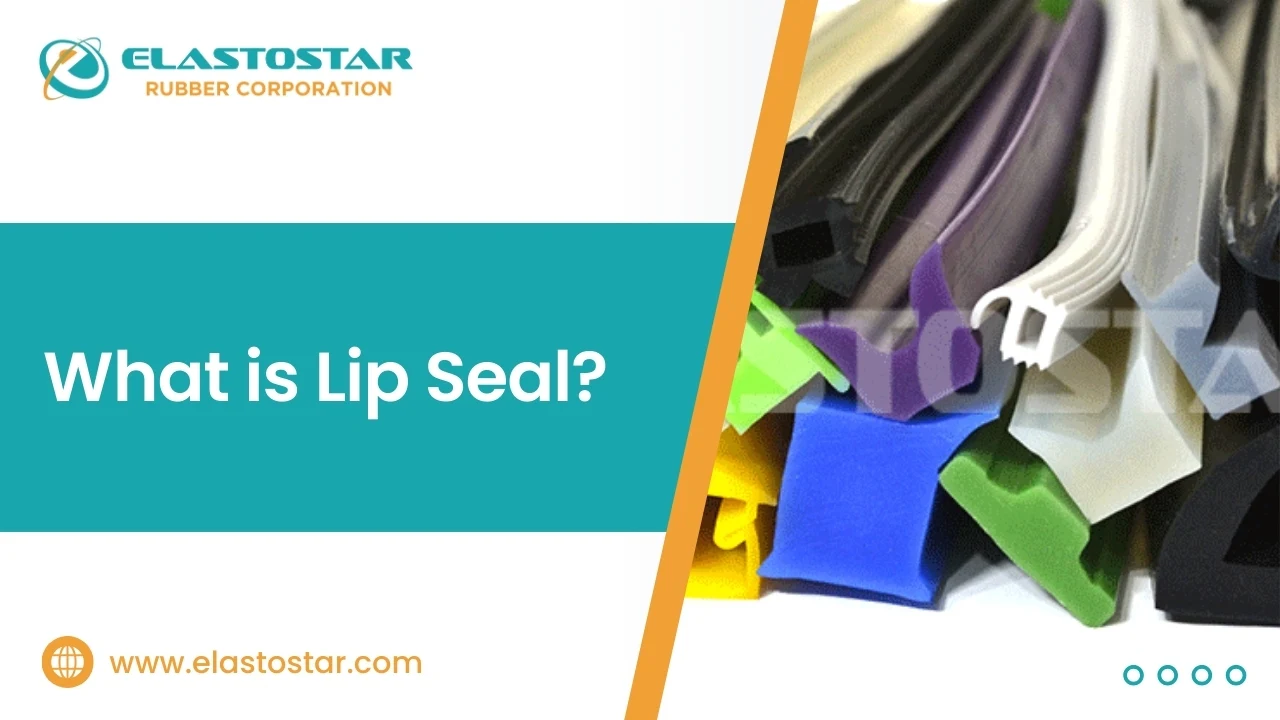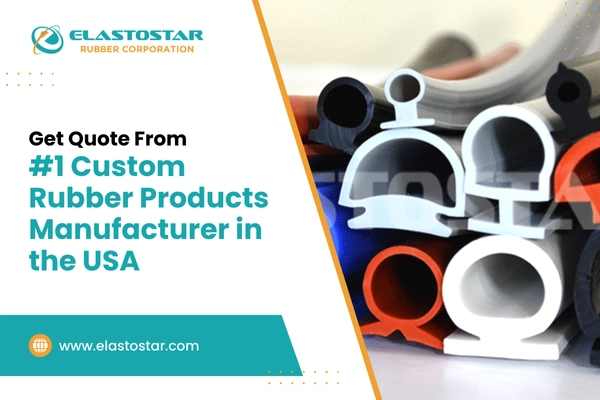Rubber Lip seals, also called lipped seals, are mechanical components designed to safeguard machinery by preventing fluid leaks and blocking contaminants like dirt and debris. These seals are critical for smooth operation in industries such as automotive, aerospace, and industrial manufacturing, where reliability and performance are paramount.
Elastostar Rubber Corporation, a trusted custom silicone manufacturer and rubber seal manufacturer, specializes in delivering precision-engineered rubber lip seals and silicone lip seals personalized for various industrial needs.
Table of Contents
What is a Lip Seal?

A lip seal is a type of sealing component with a flexible lip that presses against a rotating shaft to create a tight barrier. Its primary role is to keep fluids or gasses contained within a system while blocking contaminants like dust and moisture from entering.
These seals are typically made from durable materials such as rubber or silicone, ensuring they can handle varying pressures, temperatures, and rotational speeds. Widely used in industries like automotive and manufacturing, rubber lip seals and silicone lip seals protect equipment from damage, maintain lubrication, and extend the life span of machinery.
Read more – What are the different Types of Gaskets and Seals?
How do Lip Seals work?
A lip seal works by creating a tight barrier between the rotating shaft and the housing it fits into. The flexible lip of the seal is designed to press against the shaft, forming a seal that prevents fluid or gas from leaking out while keeping contaminants like dust and dirt from entering. The lip type seal relies on this continuous contact to maintain the integrity of the seal, even under varying pressures and speeds.
In some cases, a seal double lip design is used, which includes two sealing edges. One edge retains the lubrication inside the system, while the second lip blocks contaminants.
For applications requiring high precision, a lip seal gasket design ensures a proper fit, reducing wear, and extending the life span of the seal. This makes lip seals and gaskets an effective and reliable choice for protecting machinery in demanding environments.
What are the Types of Lip Seals?
Lip seals come in various designs to suit different applications, depending on the operating conditions and performance requirements.
Below are the common types of lip seals.
1. Single Lip Seal
A single lip seal has one sealing edge that is in direct contact with the shaft. It is designed to retain lubrication within the system and is commonly used in applications where contamination is minimal. Silicone rubber lip seals and EPDM lip seals are popular material choices for single lip seals due to their durability and flexibility.
2. Double Lip Seal
A double lip seal features two sealing edges. The primary lip keeps the lubrication in place, while the secondary lip prevents external contaminants like dust and moisture from entering the system. These seals are ideal for environments with higher exposure to dirt or water.
3. Spring-Loaded Lip Seal
Spring-loaded seals use a garter spring to apply consistent pressure on the sealing lip, ensuring a tighter fit around the shaft. This type of seal is effective in high-speed or high-pressure applications. They are often used in heavy-duty machinery where precision and reliability are critical.
4. V-Ring Seal
A V-ring seal is a type of axial lip seal that acts as a secondary seal to protect the primary seal from contaminants. It is versatile and works well in dynamic applications.
5. Lip Gasket
Lip gaskets are used where both sealing and cushioning are required. Made from materials like silicone or rubber, they are ideal for sealing irregular surfaces or where vibration is present.
Each type of lip seal is designed to address specific challenges, ensuring optimal performance in applications ranging from industrial equipment to automotive systems.
By selecting the right material, such as EPDM for weather resistance or silicone rubber lip seals for heat tolerance, the performance and lifespan of the machinery can be greatly improved.
Read More- Which Type of Rubber Gasket is the best?
What are the Materials Used?
Lip seals are made from durable materials tailored to specific operating conditions.
- Silicone: Resistant to extreme temperatures, making it ideal for high-heat applications. Often supplied by silicone rubber extrusion manufacturers.
- EPDM: Known for excellent resistance to weather, ozone, and chemicals, commonly used in outdoor and automotive environments.
- Rubber: A versatile choice for general sealing needs, widely supported by the Rubber Manufacturers Association (RMA) and used across multiple industries.
| Material | Key Features | Common Applications |
| Silicone | Heat resistance, flexibility | High-temperature machinery, aerospace |
| EPDM | Weather, ozone, and chemical resistance | Outdoor equipment, automotive systems |
| Rubber | Versatile, cost-effective | General sealing, industrial applications |
These materials are widely used by silicone rubber extrusion manufacturers, Rubber Manufacturers Association (RMA) members, and USA silicone manufacturers to ensure durability and performance in sealing solutions.
What are the Common Applications of Lip seals?
Rubber lip seals are critical components in various industries, offering reliable sealing solutions for different applications.
Key areas where they are commonly used include.
| Industry | Applications | Examples |
| Automotive | Sealing shafts in engines, transmissions, and wheel hubs | Door lip seals, axle seals |
| Industrial Machinery | Preventing fluid leaks in pumps, gearboxes, and motors | Rotary shafts, hydraulic systems |
| Aerospace | Protecting components in high-pressure and high-speed environments | Aircraft engines, actuators |
Whether for protecting sensitive components or ensuring system efficiency, rubber lip seals play a vital role in enhancing the performance and reliability of equipment.
Read More- Top 7 Applications of Silicone Rubber in the Automotive Industry.
What are the Benefits of Rubber Lip Seal Solutions?
Rubber lip seals provide essential advantages that enhance the performance and longevity of machinery and systems.
- Durability: Designed to withstand wear, pressure, and harsh operating conditions, ensuring a longer life span.
- Efficiency: Prevent fluid leaks and maintain lubrication, reducing energy loss and operational downtime.
- Reliability: Create a dependable barrier against contaminants like dust, dirt, and moisture, safeguarding machinery.
These high-quality seals ensure consistent performance in demanding environments, making them a preferred choice across various applications.
How to Choose the Right Lip Seal?
Selecting the correct lip seal is essential for optimal performance and durability.
- Operating Conditions: Assess the environment where the seal will function, including exposure to contaminants, fluids, or chemicals.
- Shaft Speed: High-speed applications require seals designed to handle increased friction and wear.
- Temperature Range: Ensure the material can withstand the operating temperature. Silicone gasket manufacturers often provide seals for high-heat applications, while general rubber gasket manufacturers cater to a broader range of conditions.
- Material Compatibility: Choose materials like rubber or silicone based on the fluid or gas being sealed.
Reputable lip seal manufacturers offer a variety of options to suit specific needs, helping ensure machinery runs efficiently and reliably under any conditions.
Installation and Maintenance of Lip Seals
Proper installation and maintenance are critical for the performance and longevity of seal double lip gaskets.
Follow these best practices.
1. Installation Tips
- Ensure the shaft and housing are clean and free from debris to avoid damaging the seal.
- Use the correct tools to press the seal into place without bending or distorting it.
- Lubricate the sealing lip before installation to reduce friction during initial operation.
2. Maintenance Guidelines
- Inspect seals regularly for wear, cracks, or deformation.
- Replace seals promptly if any damage is detected to prevent leaks or equipment failure.
Proper care during installation and periodic maintenance ensures the seal performs effectively and protects your machinery for an extended period.
Elastostar Rubber Corporation – Your Trusted Partner for High-Quality Lip Seals
Elastostar Rubber Corporation is a leading provider of high-quality lip seals, specializing in custom solutions designed to meet the unique demands of various industries. With expertise in precision engineering, we manufacture durable rubber lip seals and silicone lip seals personalized for applications in automotive, aerospace, and industrial machinery.
As a trusted rubber product manufacturer, we ensure that our lip seals deliver reliable performance, effectively preventing leaks and protecting machinery from contaminants. Our commitment to quality makes us a preferred choice for advanced sealing solutions.
Recommended Reads
- How Rubber is Made for Industrial Uses
- Can You Laser Cut Silicone Rubber?
- What is Nitrile Rubber (NBR)?

Conclusion
Lip seals are essential components that prevent fluid leaks, protect machinery from contaminants, and ensure efficient system performance across various industries. Choosing the right seal is critical for maintaining equipment reliability and longevity.
As a trusted member of the Rubber Manufacturers Association (RMA), we provide high-quality, custom sealing solutions customized to meet diverse needs. For dependable and durable lip seals, Elastostar is the name you can trust.
FAQs
- What does a lip seal mean?
A lip seal, also known as a lipped seal, is a mechanical component designed to prevent fluid leaks and keep contaminants like dirt and moisture out of machinery. It forms a tight barrier around a rotating shaft, ensuring smooth and reliable operation. At Elastostar Rubber Corporation, we specialize in high-quality lip seals for various industrial applications.
- What is the use of a lip seal?
Lip seals are essential for sealing rotating shafts, retaining lubrication, and preventing contaminants from entering equipment. They are commonly used in industries like automotive, aerospace, and manufacturing to protect machinery and maintain performance.
- How long do lip seals last?
The life span of a rubber lip seal depends on its material, operating conditions, and maintenance. Proper care and regular inspections can extend their life to several years. High-quality seals from trusted lip seal manufacturers offer greater durability.
- What is the lip seal treatment?
Lip seal treatment refers to applying coatings or finishes to the seal’s surface to enhance its performance, reduce friction, and improve resistance to wear heat, or chemicals. For instance, silicone lip seals often undergo treatment to improve their heat tolerance.
- What is the lip seal test?
A lip seal test evaluates the seal’s effectiveness under specific conditions like pressure, temperature, and rotational speed. This ensures the lip seal gasket design meets the required standards for durability and performance. At Elastostar Rubber Corporation, we rigorously test our lip seals to ensure they meet the highest standards for quality and performance.



